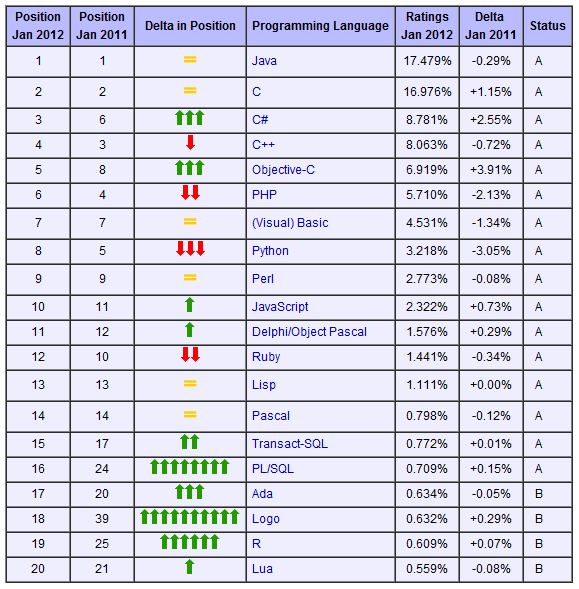Compact software development is IN, bloat is OUT!

For years I have discussed with others about how software development should get back to basics, using native code (rather than scripting languages) by using compilers optimized for creating fast and compact applications.
A recent TIOBE index reemphasizes this point.
The most telling part of the index is the graph of long term trends. What I thought was interesting with the TIOBE index long term graph is this:
- Java is strong, but its long-term trend appears to be an overall decline
- C# is growing, but is far behind Java and C (C is still twice as popular as C#)
- C++ appears to be on an overall decline amazingly
- C appears to be relatively consistent and strong and could soon pass Java
Native Coding is making a Comeback!
C is the cornerstone of native coding, particularly when it comes to Windows. It is interesting that it continues to show such a strong standing among languages. Even Microsoft, I have read, has shown an interest in getting back to native coding (albiet using C++ most likely). Why the interest in native coding after years of pushing .NET and other frameworks? It can be summed up in two words:
Speed and Size!
Yes, speed and size of applications. Maybe because of all the interest in tablet PC's and smartphones, whch really need smaller and faster applications because of their form factors (limited hardware). Maybe many are just getting tired of bloated software (takes too much space and memory and runs too slow). Whatever the reasons, it can be summed up with "compact and fast are IN" and "bloat and slow are OUT".
C is not the Only Game in Town!
So should we all start programming in C? Not necessarily. While C may be the current leader in native coding, this does not mean it is the only game in town that has a monopoly on creating fast and compact applications for Windows. Recently, I had the chance to interview Bob Zale, president and founder of Powerbasic about his BASIC language compilers. In a story for another tech site, I described Powerbasics compiler as the "software industries best kept secret". Why? Because Powerbasic is the great, great, grandchild of TurboBasic. Yes, TurboBasic still lives, but it is now a Windows compiler.
What most people don't know: Powerbasic is often used behind the scenes by many major companies and would you like to know why? Because is it the epitome of native coding for Windows. One gets the benefits of one of the best known languages, BASIC, while also being able to produce extremely compact and fast applications which rival those created with, guess what, yes C!
How do I know this? Because I have been using PowerBasic for nearly a decade now, and I can tell you that it can produce amazingly fast and compact applications.

The TIOBE index shows that maybe we should reconsider the software development tools that we use. If compact and fast is now IN, then shouldn't we use programming languages that produce this kind of software? So if you are familiar with C of any sort, then maybe C (or C++) are worth reexamining. If you like BASIC, then maybe PowerBasic is worth a look.
Likely there are some other programming languages that have the power of C, which can produce compact and fast applications. Are you using one of them? If so, why not post a comment and tell us what your favorite native coding language (capable of producing compact and fast) is.
Photo Credit: olly/Shutterstock
 Chris Boss is an advanced Windows API programmer and developer of 10 year-old EZGUI, which is now version 5. He owns The Computer Workshop, which opened for businesses in the late 1980s. He originally developed custom software for local businesses. Now he develops programming tools for use with the PowerBasic compiler.
Chris Boss is an advanced Windows API programmer and developer of 10 year-old EZGUI, which is now version 5. He owns The Computer Workshop, which opened for businesses in the late 1980s. He originally developed custom software for local businesses. Now he develops programming tools for use with the PowerBasic compiler.
